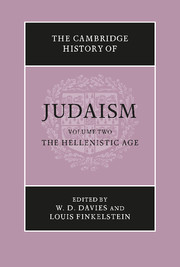Book contents
- Frontmatter
- 1 The archeology of Hellenistic Palestine
- 2 The political and social History of Palestine from Alexander to Antiochus III (333–187 B.C.E.)
- 3 Hebrew, Aramaic and Greek in the Hellenistic age
- 4 The Diaspora in the Hellenistic age
- 5 The interpenetration of Judaism and Hellenism in the pre-Maccabean period
- 6 The men of the Great Synagogue (circa 400–170 .b.c.e.)
- 7 Pharisaic leadership after the Great Synagogue (170 B.C.E.–135 C.E.)
- 8 Antiochus IV
- 9 The Hasmonean revolt and the Hasmonean dynasty
- 10 Jewish literature in Hebrew and Aramaic in the Greek era
- 11 Jewish–Greek literature of the Greek period
- 12 The Apocrypha and Pseudepigrapha of the Hellenistic period
- 13 The book of Daniel
- 14 The matrix of apocalyptic
- 15 The Septuagint and its Hebrew text
- 16 The Targumim
- 17 The Samaritans
- 18 The growth of anti-Judaism or the Greek attitude towards the Jews
- Bibliographies
- Chronological table
- Index
- References
12 - The Apocrypha and Pseudepigrapha of the Hellenistic period
Published online by Cambridge University Press: 28 March 2008
- Frontmatter
- 1 The archeology of Hellenistic Palestine
- 2 The political and social History of Palestine from Alexander to Antiochus III (333–187 B.C.E.)
- 3 Hebrew, Aramaic and Greek in the Hellenistic age
- 4 The Diaspora in the Hellenistic age
- 5 The interpenetration of Judaism and Hellenism in the pre-Maccabean period
- 6 The men of the Great Synagogue (circa 400–170 .b.c.e.)
- 7 Pharisaic leadership after the Great Synagogue (170 B.C.E.–135 C.E.)
- 8 Antiochus IV
- 9 The Hasmonean revolt and the Hasmonean dynasty
- 10 Jewish literature in Hebrew and Aramaic in the Greek era
- 11 Jewish–Greek literature of the Greek period
- 12 The Apocrypha and Pseudepigrapha of the Hellenistic period
- 13 The book of Daniel
- 14 The matrix of apocalyptic
- 15 The Septuagint and its Hebrew text
- 16 The Targumim
- 17 The Samaritans
- 18 The growth of anti-Judaism or the Greek attitude towards the Jews
- Bibliographies
- Chronological table
- Index
- References
Summary
THE DEUTEROCANONICAL OR APOCRYPHAL BOOKS
It is important at the very outset to define some terms, for the lack of agreement over terminology between Catholic and Protestant works on this subject invites confusion. The books which Catholics customarily call ‘deuterocanonical’ correspond, or very nearly correspond, to what Protestants call the apocryphal books. The term ‘deutero-canonica is contrasted with ‘protocanonical’. Now the protocanonical books are identical with those of the Hebrew Bible of Palestinian Judaism, and are the only ones which the Protestants officially accept. The deuterocanonical books appear in the Greek version of the Bible, the Septuagint. These two ancient collections of sacred writings, the one preserved in Hebrew, the other handed down in Greek, differ appreciably from one another. Apart from differences in the order of the books, and often quite important textual variants, the Septuagint is not a simple reproduction in Greek of the Hebrew Old Testament. It contains several writings which do not appear in the Hebrew canon at all, and these are the ones which the Catholics call deuterocanonical. The adjectives ‘protocanonical’ and ‘deuterocanonical’ applied to the Scriptures were not used before the sixteenth century, and are generally believed to have been invented by Sixtus of Siena (1520–1569) in his Bibliotheca Sacra of 1566. Catholics recognize seven deuterocanonical books: Judith, Tobit, 1 and 2 Maccabees, Wisdom, Ecclesiasticus and Baruch. To these must be added the Greek portions of Esther and the Greek additions to Daniel, i.e., the Prayer of Azariah and the Song of the Three Young Men (called in the older English versions the Song of the Three Holy Children), the story of Susanna and the story of Bel and the Dragon.
- Type
- Chapter
- Information
- The Cambridge History of Judaism , pp. 409 - 503Publisher: Cambridge University PressPrint publication year: 1990
References
- 2
- Cited by

